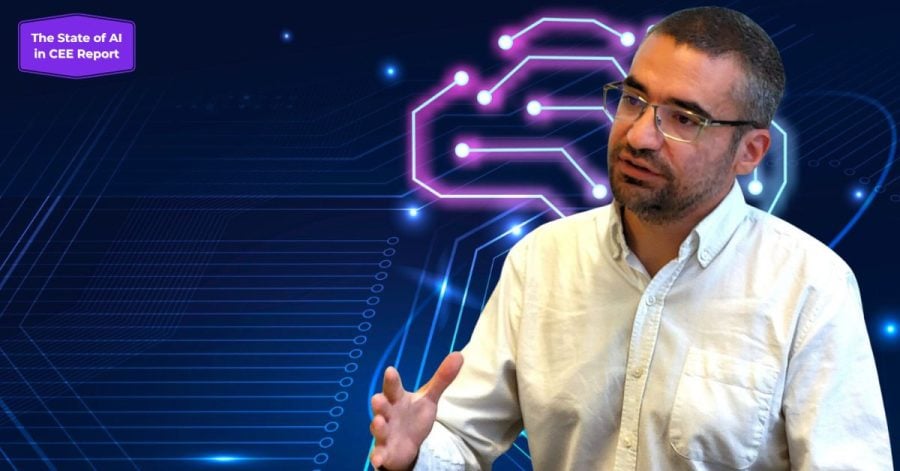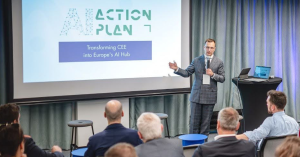In the realm where academia meets the AI industry, researchers such as Ljubisa Bojic offer an insight into the concrete results that this collaborative innovation brings. As a Senior Research Fellow at the Institute for Artificial Intelligence of Serbia and Digital Society Lab housed within the Institute for Philosophy and Social Theory at the University of Belgrade, Bojic’s research focuses on the intersections of artificial intelligence, ethics, and the dynamics of the virtual landscape.
In a conversation with The Recursive, Bojic talks about the layers of his research and experiences and perspectives on the future of AI when it comes to the ethical implications of the use of this technology.
The interview was conducted as a part of The Recursive’s “State of AI in CEE” report.
+++ Download the full report with insights from 40+experts and analysis of 900 AI product companies from CEE here.
The Recursive: How do you view the intersection between scientific research and the commercialization of the industry at present?
Ljubisa Bojic: Our current reality suggests a multi-faceted interplay between scientific research and industrial commercialization. The heart of the issue is multidisciplinary and warrants keen ardor for continued learning and knowledge exchange. Increasingly, we are becoming more aware of the urgent need to provide comprehensive education to individuals straddling the line between academic research and the business world. The goal is to better prepare these academic professionals to transition smoothly into entrepreneurship, where they can effectively commercialize and scale their research-intensive startups.
What are the current difficulties industries across the CEE face that AI can address or solve?
There’s significant potential for startup growth in the CEE region, and AI-based solutions can undoubtedly address many industrial challenges. However, funding remains a persistent challenge restraining the growth of innovative startups. Investment in the early-stage ecosystem is quite limited compared to what we see happening in Western Europe. Thus, a robust foundation for startup expansion would necessarily involve infusing more funds into early-stage AI startups.
What are the potential risks and challenges linked with the adoption of AI in industry, such as ethical considerations or public acceptance?
Introducing AI in industry does come with its fair share of risks, ethical considerations and challenges, especially concerning public acceptance. Expectedly, commercial intentions will steer the adoption of AI, with primary emphasis on maximizing profits. Such a trend could lead to job cuts, necessitating societal adjustments, including introspecting on strategies like Universal Basic Income. Ethically, the propagation of misinformation has grown increasingly easier with generative AI, and it’s a valid concern for the times ahead.
Furthermore, the quest for developing Universal General Intelligence (AGI) could also prove risky. While the idea of a central AGI platform seems appealing due to its perceived efficiency and profitability, it may expose our societies to latent dangers. On the contrary, using diverse algorithms for particular tasks that are not interconnected offers a safer path. However, the pursuit of profit may overshadow this safer approach, to the detriment of societal welfare.
What are your personal concerns regarding the ethical implications of AI in your field of research?
The reservations mentioned above about the adoption of AI and its potential fallout certainly extend to my research field as well. The increasing emphasis on profit could potentially compromise the safer and more ethical paths to AI adoption, thus posing significant societal concerns.
What are the existing and forecasted regulatory and legal frameworks in your country or the EU as a whole that influence the adoption of AI products and services?
Serbia has taken strides to establish an active AI strategy and ethical guidelines for the development and use of AI. This makes it the pioneer in the region for initiating such a move. While we remain hopeful for enacting an AI Act in the future, it serves as a reference point to the imminent EU AI Act.
Do you have any recommendations or questions for policymakers regarding AI regulation?
One area that deserves urgent attention is algorithmic recommendations, specifically those involving language model outputs and social media recommendations. Given their profound impact on people’s values, emotions, and actions, such systems should be classified as high-risk entities. At the EMERGE 2022 (an annual event organized by the Digital Society Lab), we have proposed the idea of treating recommender systems as public goods. Additionally, we have advocated the view of digital identity as a fundamental human right in the Belgrade Digital Freedom Pledge.
How would you evaluate the availability and quality of talent possessing the required AI skills in Serbia? What are the necessary skills that corporations and research institutions are seeking?
There is an evident dearth of professionals who are skilled in AI and software development overall. Equally essential is the need for AI entrepreneurs, which currently are not as many as required.
What are the key AI specializations and skills in your region?
In my observation, AI skills pertinent to the gaming industry, health tech, and blockchain technology are highly sought after in this region.
How do you evaluate the availability and the accessibility of professional advancement and training opportunities for AI specialists in the region? What impact do such initiatives have on talent retention and attraction in the AI industry?
A myriad of educational initiatives and opportunities catering to AI and related technologies are blossoming in Serbia and neighboring regions. I am heartened by the gradual increase in its accessibility and correlation with the nurturing and retention of AI talent in the local industry.
How do the region’s educational institutions and universities contribute to the talent pool for AI professionals?
Speaking for Serbia specifically, I believe that we are well-positioned with a sufficient number of universities and research institutes focusing on AI development. Our government’s contribution in establishing the Institute for Artificial Intelligence Research and Development of Serbia highlights our commitment to raising a new generation of AI professionals.
What types of opportunities do you identify concerning cross-industry collaborations or partnerships in AI innovation in our region?
Our contributions to advancing cross-industry collaborations and AI innovation are manifold. We host an annual conference, Emerge Forum on the Future of AI-Driven Humanity, where industry leaders, regulators, and academics congregate to discuss our technology-driven future. We also strive to foster industry-academia-regulator alliances through our Digital Society Lab at the Institute for Philosophy and Social Theory at the University of Belgrade. Another worthy mention is the Data Science Conference, a gathering point for AI practitioners from around the globe. On the side of media organizations I would point towards the BIRN Internet Freedom Meet which turned out to be a very successful event. Additionally, OSCE is an international organization that has been deeply and meaningfully engaged around the issue of AI ethics in the media.
What are the perceptions of the region among AI professionals, and how do they impact talent retention and attraction?
The CEE region is increasingly recognized as a budding hub of technological innovation, particularly in Artificial Intelligence, among AI professionals both internally and internationally. This positive perception is propelled by consistent advancements in AI research and development, coupled with the growing attention towards AI education and entrepreneurship in the region. Such a reputation substantially promotes talent retention by offering exciting local opportunities for AI professionals who might otherwise seek prospects in other parts of the world.
At the same time, this perception also enhances the region’s attractiveness to foreign AI professionals and researchers, who see in the CEE an environment ripe for innovative work and collaborations. Nevertheless, it’s crucial to maintain and build upon this momentum through policy support, adequate funding, and intersectional initiatives to ensure that the CEE region will continue to retain and attract top AI talent.
How would you evaluate the potential for growth and development in the AI innovation ecosystem in the CEE and why? What is the biggest challenge in your view?
The CEE holds considerable potential for growth and development in the AI innovation ecosystem. The region harbors a wealth of talent, highlighted by a strong academic tradition in mathematics and computer science, which forms the backbone of AI innovation. In addition to this, national and regional policies are being proactively shaped to foster an environment conducive to AI learning, research, entrepreneurship, and ethical considerations.
Various international corporations have also set up research and development centers in the region, signaling trust in the talent pool and its potential. The integration of AI in various sectors ranging from healthcare to gaming and blockchain also presents several opportunities for growth and diversification.
However, the major challenge, in my view, is the lack of sufficient early-stage funding for startups. Financial support is vital for turning innovative prototypes into scalable commercial products. Overcoming this challenge will require both local and foreign investors to recognize the potential return on investing in CEE, and governmental initiatives could be instrumental in encouraging this investment. Balancing this commercial growth with ethical considerations is another challenge that must be taken into account to ensure sustainable and responsible AI innovation.








